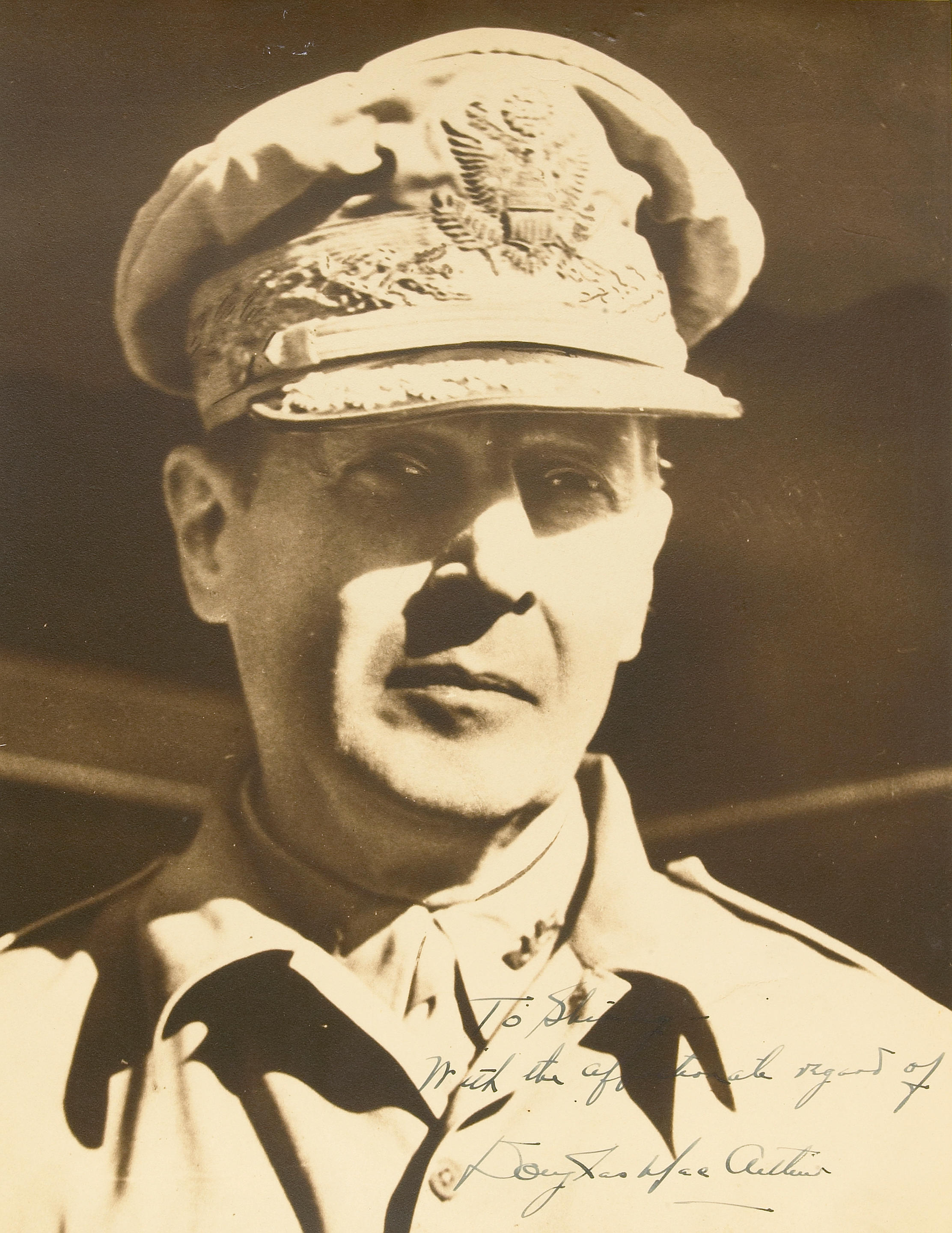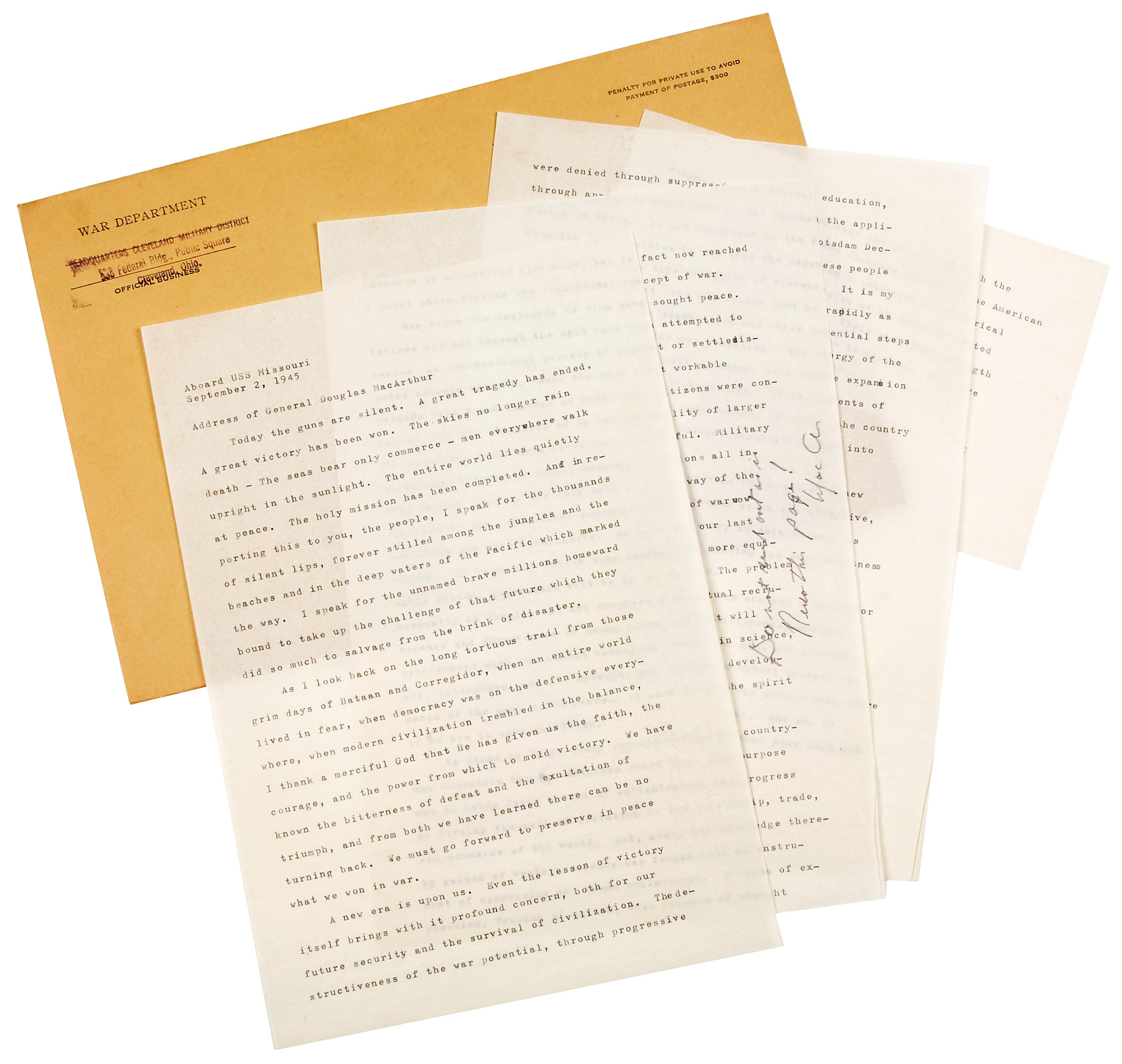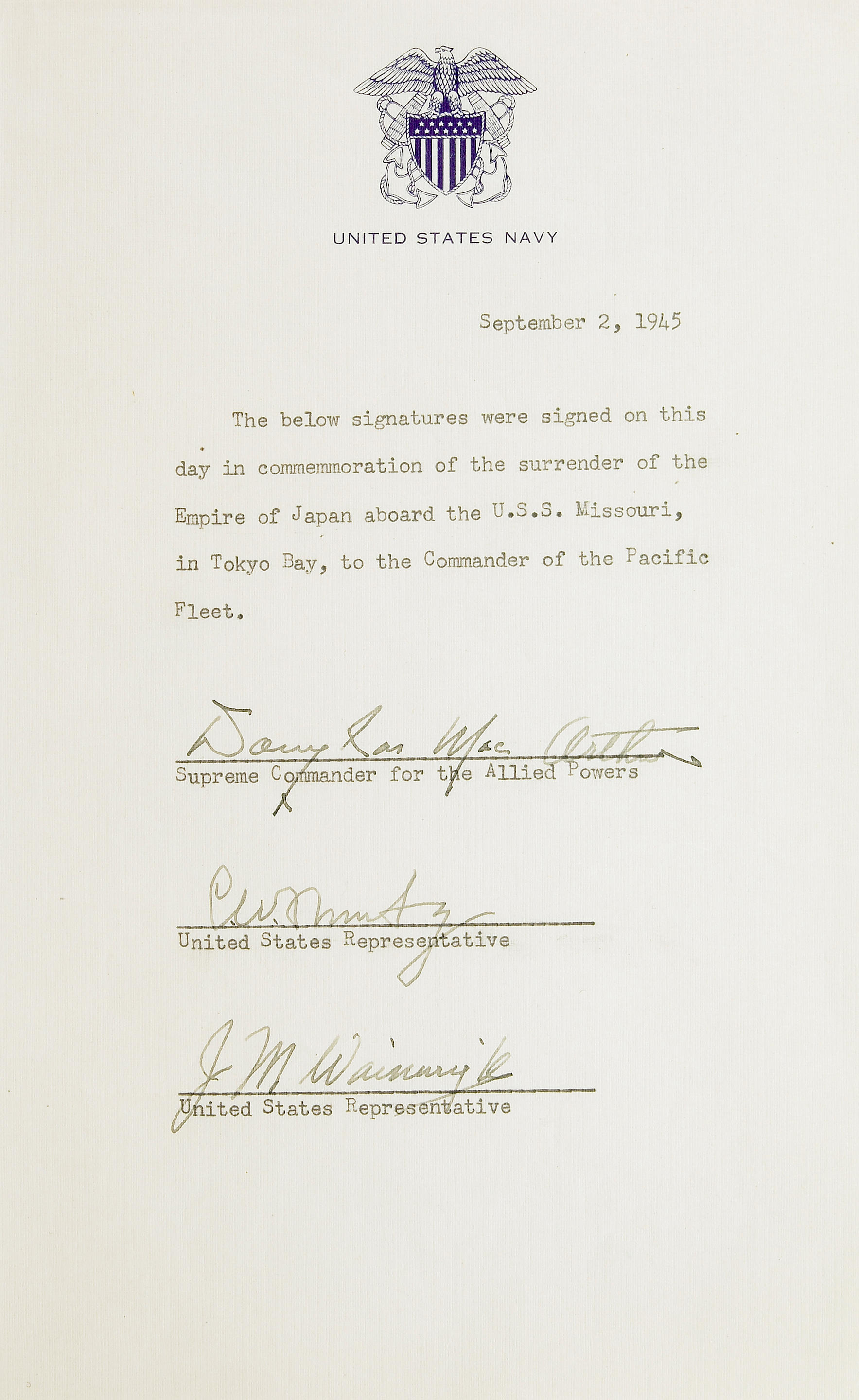MacArthur, DouglasA contemporary transcript signed ("Douglas MacArthur") of General MacArthur's radio address announcing the end of the War in the Pacific, delivered aboard the U.S.S. Missouri, 2 September 1945 4 leaves (237 x 160 mm), typed on rectos only, headed "Aboard the USS Missouri / September 2, 1945 / Address of General Douglas MacArthur," signed at the foot of the fourth page at conclusion of text, date-stamped on the same page "Sep 2 1945," accompanied by an envelope postmarked "U.S. Navy Sep 2 1945" and "USS Skagit, Tokyo Bay," in which the transcript was sent by sailor J. H. Brooks to his wife in Lakewood, Ohio. Half blue morocco slipcase, chemise. "Today the guns are silent": Douglas MacArthur addresses the American people after accepting the surrender of the Empire of Japan, marking the end of World War II. The unconditional surrender of the German armed forces ended the Second World War in Europe on 7 May 1945. The Supreme Allied Commander for that theatre, Dwight Eisenhower, had issued a characteristically terse statement of the fact: "The mission of this Allied Force was fulfilled at 0241, local time, May 7th, 1945." But fighting continued in the Pacific for nearly four more months, and when the Japanese finally signed the official instrument of surrender, the Supreme Allied Commander of the Pacific, Douglas MacArthur, also delivered a characteristic statement. Perhaps already looking ahead to his (unsuccessful) foray into presidential politics, MacArthur addressed the American public directly, via radio, and laid out at some length his thoughts on the just-completed war and his vision for the future. "Today the guns are silent. A great tragedy has ended. A great victory has been won. The skies no longer rain death—the seas bear only commerce—men ever[y]where walk upright in the sunlight. The entire world lies quietly at peace. And in reporting this to you, the people, I speak for the thousands of silent lips, forever stilled among the jungles and the beaches and in the deep waters of the Pacific which marked the way. … A new era is upon us. Even the lesson of victory itself brings with it profound concern, both for our future security and survival of civilization. The destructiveness of the war potential, through progressive advance in scientific discovery, has in fact now reached a point which revises the traditional concept of war. … "We have had our last chance. If we do not devise some greater and more equitable system, Armageddon will be at our door. … We stand in Tokyo today reminiscent of our countryman Commodore Perry ninety two years ago. His purpose was to bring to Japan an era of enlightenment and progress by lifting the veil of isolation to the friendship, trade, and commerce of the world. But, alas, the knowledge thereby gained of Western science was forged into an instrument of oppression and human enslavement. … We are committed by the Potsdam Declaration of principles to see that the Japanese people are liberated from this condition of slavery." MacArthur concludes with a tribute to the American forces that must have been meant to appeal as well to American voters: "And so, my fellow countrymen, today I report to you that your sons and daughters have served you well and faithfully with the calm, deliberate, determined fighting spirit of the American soldier, and sailor, based upon a position of historical truth, as against the fanaticism of an enemy supported only by mythological fiction. Their spiritual strength and power has brought us through to victory. They are homeward bound—take care of them." Transcripts of MacArthur's speech are much less common in the market than are copies of Eisenhower's taciturn statement. The present copy is one of just two that can be linked to the spot of the Japanese surrender. The U.S.S. Skagit, on which J. H. Brooks served, was a Tolland-class attack cargo ship. She was commissioned on 2 May 1945, and sailed first to Marseille. She left France at the end of
MacArthur, DouglasA contemporary transcript signed ("Douglas MacArthur") of General MacArthur's radio address announcing the end of the War in the Pacific, delivered aboard the U.S.S. Missouri, 2 September 1945 4 leaves (237 x 160 mm), typed on rectos only, headed "Aboard the USS Missouri / September 2, 1945 / Address of General Douglas MacArthur," signed at the foot of the fourth page at conclusion of text, date-stamped on the same page "Sep 2 1945," accompanied by an envelope postmarked "U.S. Navy Sep 2 1945" and "USS Skagit, Tokyo Bay," in which the transcript was sent by sailor J. H. Brooks to his wife in Lakewood, Ohio. Half blue morocco slipcase, chemise. "Today the guns are silent": Douglas MacArthur addresses the American people after accepting the surrender of the Empire of Japan, marking the end of World War II. The unconditional surrender of the German armed forces ended the Second World War in Europe on 7 May 1945. The Supreme Allied Commander for that theatre, Dwight Eisenhower, had issued a characteristically terse statement of the fact: "The mission of this Allied Force was fulfilled at 0241, local time, May 7th, 1945." But fighting continued in the Pacific for nearly four more months, and when the Japanese finally signed the official instrument of surrender, the Supreme Allied Commander of the Pacific, Douglas MacArthur, also delivered a characteristic statement. Perhaps already looking ahead to his (unsuccessful) foray into presidential politics, MacArthur addressed the American public directly, via radio, and laid out at some length his thoughts on the just-completed war and his vision for the future. "Today the guns are silent. A great tragedy has ended. A great victory has been won. The skies no longer rain death—the seas bear only commerce—men ever[y]where walk upright in the sunlight. The entire world lies quietly at peace. And in reporting this to you, the people, I speak for the thousands of silent lips, forever stilled among the jungles and the beaches and in the deep waters of the Pacific which marked the way. … A new era is upon us. Even the lesson of victory itself brings with it profound concern, both for our future security and survival of civilization. The destructiveness of the war potential, through progressive advance in scientific discovery, has in fact now reached a point which revises the traditional concept of war. … "We have had our last chance. If we do not devise some greater and more equitable system, Armageddon will be at our door. … We stand in Tokyo today reminiscent of our countryman Commodore Perry ninety two years ago. His purpose was to bring to Japan an era of enlightenment and progress by lifting the veil of isolation to the friendship, trade, and commerce of the world. But, alas, the knowledge thereby gained of Western science was forged into an instrument of oppression and human enslavement. … We are committed by the Potsdam Declaration of principles to see that the Japanese people are liberated from this condition of slavery." MacArthur concludes with a tribute to the American forces that must have been meant to appeal as well to American voters: "And so, my fellow countrymen, today I report to you that your sons and daughters have served you well and faithfully with the calm, deliberate, determined fighting spirit of the American soldier, and sailor, based upon a position of historical truth, as against the fanaticism of an enemy supported only by mythological fiction. Their spiritual strength and power has brought us through to victory. They are homeward bound—take care of them." Transcripts of MacArthur's speech are much less common in the market than are copies of Eisenhower's taciturn statement. The present copy is one of just two that can be linked to the spot of the Japanese surrender. The U.S.S. Skagit, on which J. H. Brooks served, was a Tolland-class attack cargo ship. She was commissioned on 2 May 1945, and sailed first to Marseille. She left France at the end of















Testen Sie LotSearch und seine Premium-Features 7 Tage - ohne Kosten!
Lassen Sie sich automatisch über neue Objekte in kommenden Auktionen benachrichtigen.
Suchauftrag anlegen